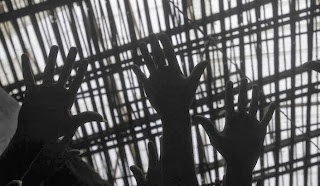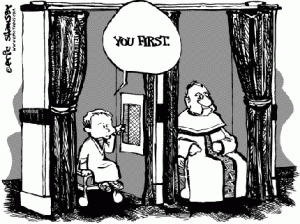No fear No Favour No TKO's
STEPHEN GROOTES SOUTH AFRICA 31 OCTOBER 2013 01:19
On Tuesday night STEPHEN GROOTES, who likes to think he can put people in a tight spot, found himself on the wrong side of the conversation. He'd invited Mac Maharaj to interview him about his new book, SA Politics Unspun. Unfortunately for Grootes, Maharaj accepted. This is Grootes' version of events. And he does not write it as a journalist. This is his subjective view of what it was like in the hot-seat.
STEPHEN GROOTES SOUTH AFRICA 31 OCTOBER 2013 01:19
On Tuesday night STEPHEN GROOTES, who likes to think he can put people in a tight spot, found himself on the wrong side of the conversation. He'd invited Mac Maharaj to interview him about his new book, SA Politics Unspun. Unfortunately for Grootes, Maharaj accepted. This is Grootes' version of events. And he does not write it as a journalist. This is his subjective view of what it was like in the hot-seat.
The problem with finding yourself being interviewed by Mac Maharaj is that you are being interviewed by Mac Maharaj. It's a bit like being cross-examined by Wim Trengove. To quote Pierre de Vos' advice, “don't”. Most people probably knew this before Tuesday night. I, being pig-headed, had to find out the hard way.
The problem is not just that he is a spin-doctor. It's that he's much more than that. He is not only a politician in his own right, it's that he is one of heroes of the Struggle. This means that you are dealing with a personality who is not just good with words, but actually a political operator in the Gwede Mantashe mould. Someone who is able to convince people to do things by sheer force of words. And when the time came, he was happy and willing to put his body on the line too.
The idea of having a politician interview me, a journalist, was mine. Like the three errors Maharaj pointed out in my book, this choice was mine, and mine alone.
There's a certain luxury in being the media person conducting an interview. You control the airwaves, the on and off buttons, the entire format is yours. This, I found out, gives you a tremendous advantage. It also means that you are just playing a role. You are the inquisitor whose job it is to get the facts out of whoever is in front of you. So it's not about you, it's about them. They have a position to defend, and you have a fortress to attack. It's quite fun, really.
I don't know if Maharaj enjoyed doing the attacking, but from the way I felt, he certainly should have. Because when you write a book, it is about you. In the same way that your integrity or your political principle is on the line when the roles are in their usual position. So, when the tables were turned, I found it more than deeply uncomfortable.
Watch: SA Politics Unspun with Stephen Grootes - Constitutional Court
It started badly. Maharaj was able to set the terms of engagement, that he and I would shake hands and agree that facts are important. I should have known better. But the moment my public life really flashed before my eyes was during what came next. Maharaj pointed out that I was wrong about the amount of time between OR Tambo’s arrival home from exile and his death.
I was able to swallow that. It's important in these public encounters not to show emotion. If I've learnt anything from Gwede Mantashe over the years, it's that the person who looks the most confident often wins. It's a bit like a rugby match. Sometimes the team that piles on the most pressure at the start ends up losing, because the other team is able to soak it up. Not that I won this first encounter, mind you.
Then we moved on to what has been a consistent, and incorrect claim from myself about the history of Pravin Gordhan, Maharaj himself, and President Jacob Zuma. He pointed out that what I've written in the book about his relationship with President Jacob Zuma and Operation Vula is factually incorrect, or just wrong. It was impossible to answer back, because he was there, and I was not. He then said that he and Zuma "have never had a social meal together", the point being that they are not that close. I find that odd. It doesn't seem to make sense. Remember what Maharaj went through with the Hefer Commission, in what looked like an attempt to protect Zuma from that corruption investigation? Why do that for someone if they're not a friend?
But I owe you, dear reader, and Maharaj and Zuma and Gordhan, an apology. I accept that you were not all part of the same section of Operation Vula. It will be removed from any subsequent issues of the book.
I'm sorry.
Maharaj Two. Grootes Nil.
Looking at someone to whom you have given plenty of hell over the years when he's in complete control, and he's just pointed out two factual errors in your book, is not a sight from the happier parts of my psyche. To look at the large pile of paper he'd brought with him was almost to lose control.
But then again, like that rugby match, the balance does shift. Because he then moved to the Constitution. I was on stronger ground here, because my publishers had a lawyer specifically go through that section. Which means that we were going to have to argue around interpretation.
Maharaj says my interpretation of the Constitution is wrong on three main points.
Firstly, he denies that it was specifically designed to protect minorities. My answer was that the reason we have the Bill of Rights was to ensure that everyone is protected, which automatically includes minorities. In other words, this part of the Constitution protects us all, and it would not have been written like that, if there were not a reason to deliberately protect minorities. The point that it doesn't explicitly say this isn't really the issue, on my reading at least. It's implicit in the Constitution anyway.
Then there's the Property Clause, and my claim that this was part of the compromise, because whites wanted to keep their property. I have to say on this, that since the book went to print, both Valli Moosa and Tito Mboweni have said this was not the result of a compromise. But when Moosa first made those comments, Luthuli House itself would not publicly agree or disagree with him. The view I got from speaking to people there was that they in fact disagreed with Moosa, and they did not want to say that in public. Mboweni's comments appeared in BDlive on the morning of the launch, and he was not available to speak about them. I can't help but feel there may well be a debate within the ANC on this that's still underway. But remember, Maharaj was there, and I was not.
Maharaj's other main point on the Constitution was that somehow I was wrong to say the Constitutional Court was "fond of saying it was to protect us from the Tyranny of the Majority". We went more than six rounds on this. He says it's never featured in a judgment, and the research he's done proves this. My riposte, that I saw and heard Albie Sachs say it in court, did not seem to satisfy him. I'm certain other judges have said it as well.
His main point with all of this seemed to be that I believed that the majority is a tyranny. There must be racial subtext in here somewhere. But I can't quite see it.
It was then that I realised that the dynamic was moving. We'd been on the Constitution for quite some considerable time. And if he'd had a hundred factual mistakes in the book, he would have been well past point number thirty-five by now. Instead he wasn't racking up the points. Which meant he didn't actually have a hundred mistakes to point to.
There are several lessons in all of this. For me, as a person who generally does his journalism through interviews, it was a study in what it can be like when the pressure is on you. It is very, very different when it is you that is on trial. Not playing a role, you. And this means that it does feel very, very personal. Quite frankly, it feels super-kak.
But that's a superficial point. The main point that I do believe Maharaj succeeded in making, is that in South Africa there is a process of "myth-making" that goes on in our media, and that people who dabble in political analysis, like myself, are partially to blame for this. Why did I get that Operation Vula claim so wrong? Why had I just accepted it? Laziness, probably. [We take it you’ll be reading Padraig O’Malley’s book soon. - Ed]
And there will be some people who will quote it from what I've written on this site, and repeat it endlessly. Even though it's not true.
I could say that I speak to Maharaj often. It's a claim I've made several times before, and he's never corrected me. Perhaps he does lose some of this right to complain about that. But perhaps not. After all, I got the fact wrong.
But I do accept that "myth-making" is happening in our political analysis. Perhaps the ANC, perhaps government, have more of a duty to point out incorrect facts when they see them. Perhaps the slightly secretive nature of Zuma himself is part of this dynamic. But the onus should still be on people like me to get these facts right.
There is one other point that I feel, through sheer self-interest, that I must make. Maharaj didn't discuss anything about the current political situation. Which is what the book is about. It talks about our history up until 2013 and the Constitution up until page 31. So there over 200 other pages that he did not canvass at all. These are the sections about the ANC, Zuma himself, and the current controversies that we talk about all the time.
Why not? Probably because it didn't suit him to. And he was in control, because I'd let him be. He's Zuma’s spokesperson and his job is to protect him. That he succeeded in doing, by simply not letting the conversation get there.
Politics in South Africa is something of a spectator sport. It's fun to watch. But what I really learnt from Maharaj is that it's not a sport for the people involved. It's far more important than that. And to defend themselves in public, from people like me, as I had to on Tuesday night, is tough.
But that's politics. DM
Grootes' book SA Politics Unspun is out now. Mac Maharaj says it contains at least two errors about our political history. He hasn't yet mentioned any errors about our current politicians, Zuma himself, the ANC, the other parties, cabinet, and the controversies. When he's not being grilled by Maharaj, Grootes is happier doing the grilling on the Midday Report, and as the Senior Political Reporter for Eyewitness News. This is the last time he'll be interviewed by Maharaj. And he would advise everyone else to avoid a similar fate.
DAILY MAVERICK
COMMENTS BY SONNY
IF YOUR VENTURE INTO THE RING BE ASSURED OF YOUR FOOT WORK!
LUCIFER DOES NOT PULL PUNCHES!!




























